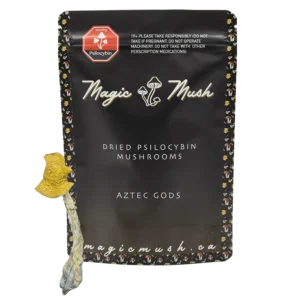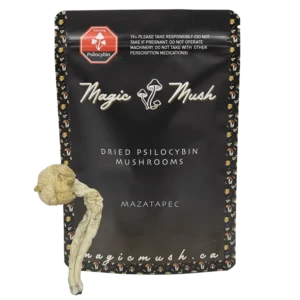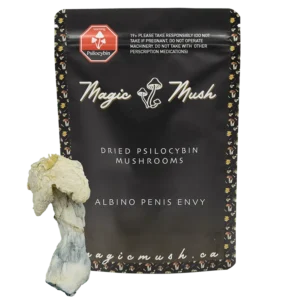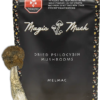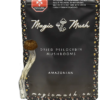Food addiction is one of those modern afflictions that can quietly take over someone’s life. I know this because I’ve experienced it firsthand.
There was a time when food became more than just sustenance for me—it was a comfort, an escape, and something I couldn’t control. Late-night binge-eating sessions were routine, and no matter how much willpower I tried to muster, I always found myself back in the kitchen reaching for more.
But here’s the thing: food addiction isn’t just about a lack of self-control. It’s deeply tied to emotions, mental health, and sometimes even trauma.
That’s why traditional treatments often fall short. Therapy and medications can help to a degree, but they don’t always address the root causes.
In recent years, there’s been a growing interest in alternative therapies for food addiction, particularly involving psychedelics like psilocybin—the active compound found in magic mushrooms.
These fungi, once dismissed as a purely recreational drug, are now being explored for their potential in treating complex issues like food addiction. It’s an exciting frontier that’s opening up, and for many, it offers a beacon of hope.
Food Addiction: What It Is and Why It’s a Growing Issue
Food addiction is more than just an occasional indulgence in junk food; it’s a behavioral disorder with roots deeply tied to psychological, emotional, and even physical factors. Like other addictions, food addiction is driven by compulsive behaviors, often fueled by an emotional need rather than hunger.
People who struggle with this condition might experience uncontrollable cravings, eat in secret, and feel guilt or shame after eating—but still find themselves repeating the cycle, often without understanding why.
What makes food addiction so complex is that, unlike other addictive substances, food is essential for survival. You can’t simply “quit” food like you would drugs or alcohol. The challenge lies in creating a healthy, balanced relationship with food while trying to avoid the triggers that lead to binge eating or emotional overeating.
For many, this relationship is entangled with feelings of comfort, reward, or even punishment. Food becomes a mechanism for managing emotions rather than a source of nutrition, and breaking free from this cycle can feel impossible without the right tools.

Food addiction is one of those modern afflictions that can quietly take over someone’s life. I know this because I’ve experienced it firsthand.
There was a time when food became more than just sustenance for me—it was a comfort, an escape, and something I couldn’t control. Late-night binge-eating sessions were routine, and no matter how much willpower I tried to muster, I always found myself back in the kitchen reaching for more.
But here’s the thing: food addiction isn’t just about a lack of self-control. It’s deeply tied to emotions, mental health, and sometimes even trauma. That’s why traditional treatments often fall short. Therapy and medications can help to a degree, but they don’t always address the root causes.
In recent years, there’s been a growing interest in alternative therapies for food addiction, particularly involving psychedelics like psilocybin—the active compound found in magic mushrooms.
These fungi, once dismissed as a purely recreational drug, are now being explored for their potential in treating complex issues like food addiction. It’s an exciting frontier that’s opening up, and for many, it offers a beacon of hope.
Food Addiction: What It Is and Why It’s a Growing Issue
Food addiction is more than just an occasional indulgence in junk food; it’s a behavioral disorder with roots deeply tied to psychological, emotional, and even physical factors. Like other addictions, food addiction is driven by compulsive behaviors, often fueled by an emotional need rather than hunger.
People who struggle with this condition might experience uncontrollable cravings, eat in secret, and feel guilt or shame after eating—but still find themselves repeating the cycle, often without understanding why.
What makes food addiction so complex is that, unlike other addictive substances, food is essential for survival. You can’t simply “quit” food like you would drugs or alcohol.
The challenge lies in creating a healthy, balanced relationship with food while trying to avoid the triggers that lead to binge eating or emotional overeating. For many, this relationship is entangled with feelings of comfort, reward, or even punishment.
Food becomes a mechanism for managing emotions rather than a source of nutrition, and breaking free from this cycle can feel impossible without the right tools.
The Brain Chemistry Behind Food Addiction
At the heart of food addiction is the brain’s reward system, which is hijacked by highly palatable foods—those that are high in sugar, fat, and salt. When we consume these foods, our brains release dopamine, a neurotransmitter associated with pleasure and reward.
Over time, as someone repeatedly indulges in these foods, the brain becomes conditioned to seek out more, requiring larger amounts to achieve the same level of satisfaction.
This creates a cycle similar to substance addiction, where individuals are compelled to consume more and more to get the desired effect, despite the negative consequences on their health and well-being.
The Emotional Triggers: Stress, Anxiety, and Trauma as Root Causes
Beyond the brain chemistry, food addiction is often a symptom of deeper emotional struggles. Many people turn to food as a coping mechanism for stress, anxiety, or unresolved trauma.
For some, it may provide temporary relief from emotional pain or serve as a distraction from difficult feelings. This emotional reliance on food can make it incredibly hard to break the addiction, as the root cause is not addressed by simply changing one’s diet or following a new meal plan.
Compounding this issue is the fact that food addiction is often misunderstood or dismissed as a lack of willpower.
Society tends to view overeating or obesity through a moral lens, placing blame on the individual rather than recognizing the underlying psychological and physiological factors. This stigma can prevent individuals from seeking help, leaving them trapped in a cycle of shame and self-blame.
Magic Mushrooms: Beyond Recreational Use—A Breakthrough in Therapy
Magic mushrooms have long been associated with recreational use and counterculture movements, but beneath their psychedelic effects lies an untapped potential for healing.
Psilocybin, the psychoactive compound in these mushrooms, is now being studied extensively for its therapeutic benefits. Psilocybin’s effects on the brain go beyond mere hallucinations; it can promote profound introspection, emotional breakthroughs, and even a rewiring of unhealthy thought patterns.
Researchers are now discovering that psilocybin may offer more than just a way to expand one’s consciousness—it could also be a powerful tool in addressing various forms of addiction, including food addiction. With psilocybin therapy, individuals can confront deep-seated emotional and psychological triggers that conventional treatments often miss.
Check out this Magic Mushrooms Available in Magic Mush
Recommended products
-
Aztec Gods Magic Mushrooms (Dried)
$60.00 – $240.00 -
Mazatapec Dried Magic Mushrooms
$55.00 – $220.00 -
Albino Penis Envy Magic Mushrooms (Dried)
$70.00 – $280.00
Check out for more range of magic mushrooms here!
How Psilocybin Might Offer a Groundbreaking Solution for Food Addiction
The exciting thing about psilocybin therapy for food addiction is that it doesn’t just mask the symptoms; it addresses the underlying psychological and emotional causes.
By facilitating a more profound understanding of one’s relationship with food, psilocybin opens up the potential for real, lasting change. Studies are beginning to support this, showing that magic mushrooms might be a new frontier in addiction recovery.
Magic Mushrooms and Food Addiction Therapy: A Deeper Understanding of the Problem
Defining Food Addiction: The Compulsive Nature of Unhealthy Eating Patterns
Food addiction operates similarly to other types of addictions like alcoholism or drug abuse. It’s characterized by compulsive eating behaviors, a preoccupation with food, and continued overconsumption despite the negative consequences.
People with food addiction often feel trapped in a cycle of binge eating, followed by feelings of guilt and shame, which then lead to further emotional eating.
This compulsive behavior can stem from various factors, including stress, trauma, and emotional imbalances. For many, food becomes a coping mechanism—a way to self-soothe and escape difficult feelings.
Current Treatments: The Limitations of Conventional Methods Like CBT and Medication
Despite the growing awareness of food addiction, treatment options remain limited. Cognitive Behavioral Therapy (CBT) is one of the most common therapeutic approaches, helping people recognize and change negative thought patterns related to food.
Medications like appetite suppressants or antidepressants are also used to curb cravings and manage emotional eating.
However, these treatments have their limitations. CBT, while effective for some, often requires long-term commitment and doesn’t always address the deeper emotional issues behind food addiction.
Medications, on the other hand, can come with side effects and often only treat the symptoms rather than the root cause of the addiction.
The Need for Innovation: Why Alternative Therapies Like Psilocybin Are Gaining Attention
The growing interest in psilocybin therapy stems from the limitations of conventional treatments. People are seeking out alternative therapies that offer more holistic and transformative results.
Psilocybin’s ability to facilitate emotional breakthroughs and encourage introspection makes it a unique candidate for treating food addiction. It’s not just about curbing cravings—it’s about addressing why the cravings are there in the first place.
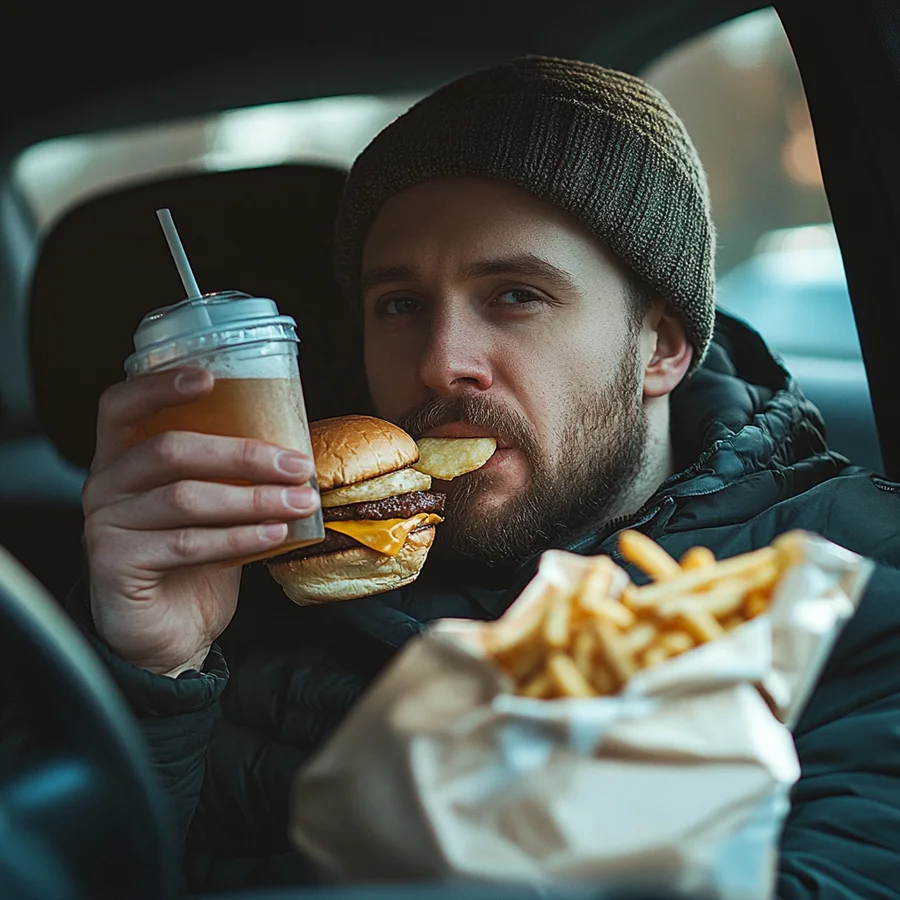
The Science of Magic Mushrooms: Transforming Food Addiction Therapy
Psilocybin 101: The Active Compound in Magic Mushrooms and How It Interacts with the Brain
Psilocybin works by interacting with serotonin receptors in the brain, particularly the 5-HT2A receptor. Serotonin is a neurotransmitter that regulates mood, appetite, and emotional responses.
When psilocybin binds to these receptors, it can induce profound changes in perception, cognition, and emotional processing.
For individuals with food addiction, this can be particularly beneficial. Psilocybin allows users to step outside their habitual thought patterns, enabling them to examine their relationship with food from a new perspective.
This shift in consciousness can help individuals break free from the automatic responses and compulsions that drive their addiction.
Neuroscientific Insights: Psilocybin’s Role in Boosting Serotonin and Promoting Neuroplasticity
One of the most exciting aspects of psilocybin therapy is its ability to promote neuroplasticity—the brain’s ability to reorganize itself by forming new neural connections.
For people struggling with food addiction, this is crucial. Neuroplasticity enables individuals to rewire their brains, breaking free from the ingrained habits and thought patterns that contribute to their addiction.
Psilocybin also boosts serotonin levels, which is essential for mood regulation and emotional well-being. Many individuals with food addiction struggle with anxiety, depression, or other mood disorders that exacerbate their unhealthy eating habits.
By boosting serotonin and promoting a sense of well-being, psilocybin can help individuals feel more in control of their emotions and less reliant on food for comfort.
Why It Matters: How These Brain Changes Offer Potential for Addressing Food Addiction
The changes that psilocybin induces in the brain are not just temporary. Studies have shown that the therapeutic benefits of psilocybin can last for months or even longer, offering individuals a new way of relating to food and their emotional triggers.
This long-term impact is what sets psilocybin apart from other treatments that may offer only short-term relief.
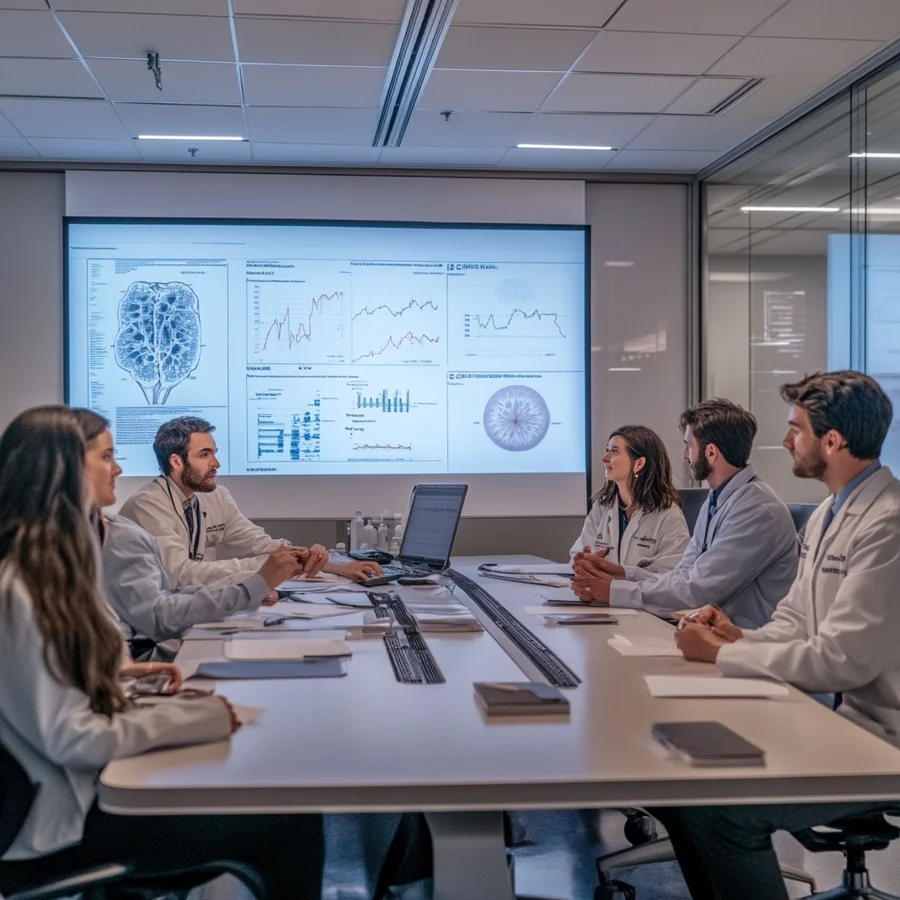
Clinical Trials: Early Wins and Promising Results in Magic Mushroom-Based Food Addiction Therapy
Initial Clinical Data: Overview of Early Positive Outcomes from Trials
In recent years, there has been a surge of interest in clinical trials investigating the potential of psilocybin for treating various forms of addiction, including food addiction. Early results are promising, with several studies reporting significant reductions in compulsive eating behaviors following psilocybin therapy.
2023 University of Florida Study: Reduced Binge Eating Episodes by 80.4% Post-Treatment
One of the most notable studies was conducted at the University of Florida in 2023. The trial focused on individuals who struggled with binge eating disorder, a common form of food addiction.
Participants were given a controlled dose of psilocybin in a therapeutic setting. The results were staggering—binge eating episodes were reduced by 80.4% in the weeks following the treatment.
Phase 1 Feasibility Study: Demonstrating Safety and Reducing Body Image Concerns in Women with AN
Another groundbreaking study focused on women with anorexia nervosa (AN), a condition often intertwined with food addiction and body image concerns. This phase 1 feasibility study demonstrated not only the safety of psilocybin therapy but also its potential for reducing body image concerns.
This is particularly relevant for individuals with food addiction, as body dissatisfaction is often a driving force behind compulsive eating behaviors.
What This Means: The Potential for Psilocybin to Become a Standard in Addiction Therapy
The results of these clinical trials suggest that psilocybin therapy could become a standard treatment option for food addiction in the future.
With its ability to address both the emotional and neurological aspects of addiction, psilocybin offers a comprehensive approach that goes beyond symptom management.

Psilocybin Therapy: A New Paradigm in Magic Mushroom-Based Food Addiction Treatment
How Psilocybin is Shifting Treatment: A Look at the Groundbreaking Effects on Addiction Recovery
Psilocybin therapy is not just another alternative treatment; it represents a paradigm shift in how we approach addiction recovery.
Unlike traditional treatments that focus on managing symptoms, psilocybin aims to address the root causes of addiction by facilitating deep emotional healing and promoting new ways of thinking.
Patient-Centered Treatment: How Magic Mushrooms are Embracing Holistic Healing Approaches
One of the key aspects of psilocybin therapy is its patient-centered approach. Magic mushrooms are used in a therapeutic setting, often in conjunction with psychotherapy, to help individuals explore their emotional triggers and develop healthier coping mechanisms.
This holistic approach is crucial for individuals with food addiction, as it allows them to heal both mentally and emotionally.
Real-Life Stories: Testimonials from Individuals Who’ve Successfully Combated Food Addiction with Psilocybin
Many individuals who have undergone psilocybin therapy for food addiction report profound changes in their relationship with food.
For some, it was the first time they were able to confront the emotional issues that had been driving their addiction. Others describe a newfound sense of freedom from the compulsive behaviors that had controlled their lives for years.
One such individual, Sarah, shared her experience: “After my psilocybin session, I felt like a weight had been lifted. I no longer felt the need to use food as an emotional crutch. It was like I had finally broken free from the cycle of addiction.”

The Future of Food Addiction Treatment with Magic Mushrooms
The potential of psilocybin in treating food addiction is both exciting and highly promising. With ongoing research and clinical trials consistently showing positive outcomes, it’s becoming increasingly evident that magic mushrooms could be a powerful new tool in the battle against food addiction.
By targeting the emotional and neurological aspects of the disorder, psilocybin therapy offers a holistic and transformative approach to recovery.
As someone who has faced the challenges of food addiction, I’m optimistic about the future of this treatment. Exploring options like Microdose capsules, Mushroom gummies, Magic mushroom chocolates, or Dried magic mushrooms could provide various pathways for healing.
For those nearby, magic mushrooms in California present accessible opportunities to engage with this innovative therapy. Though it’s a new frontier, it holds real promise for creating lasting change and supporting those seeking a healthier, more balanced life.
Is psilocybin safe for everyone?
Psilocybin should be used under professional guidance, especially for individuals with certain psychological conditions or a predisposition to mental health issues.
Can psilocybin be used as a standalone treatment for food addiction?
Psilocybin is best used as part of a comprehensive treatment plan, including psychotherapy and lifestyle changes.
How long do the effects of psilocybin last?
While the immediate psychedelic experience is temporary, the neuroplastic changes induced by psilocybin can have long-term benefits.
Psilocybin should be used under professional guidance, especially for individuals with certain psychological conditions or a predisposition to mental health issues.
Psilocybin is best used as part of a comprehensive treatment plan, including psychotherapy and lifestyle changes.
While the immediate psychedelic experience is temporary, the neuroplastic changes induced by psilocybin can have long-term benefits.
